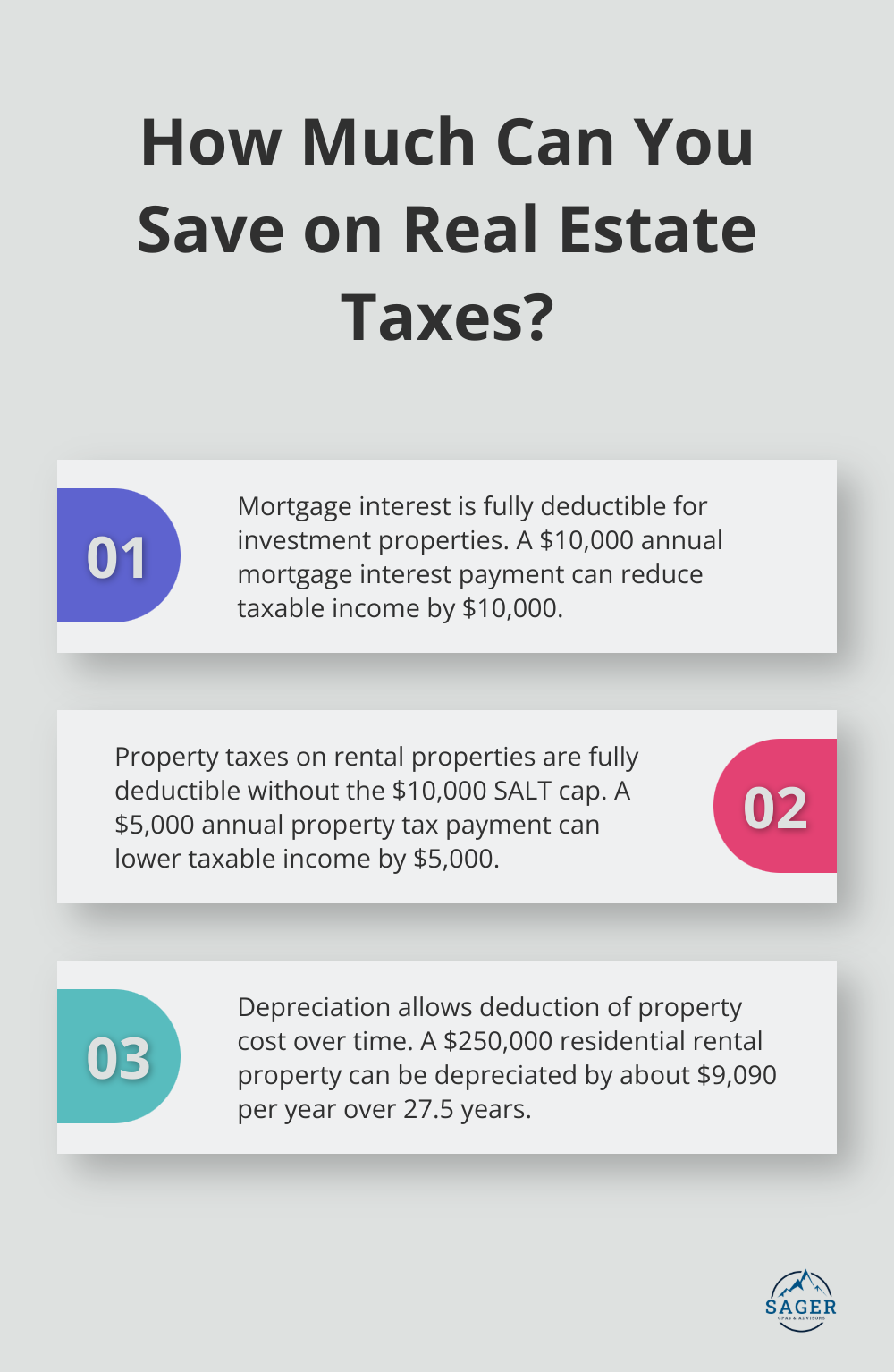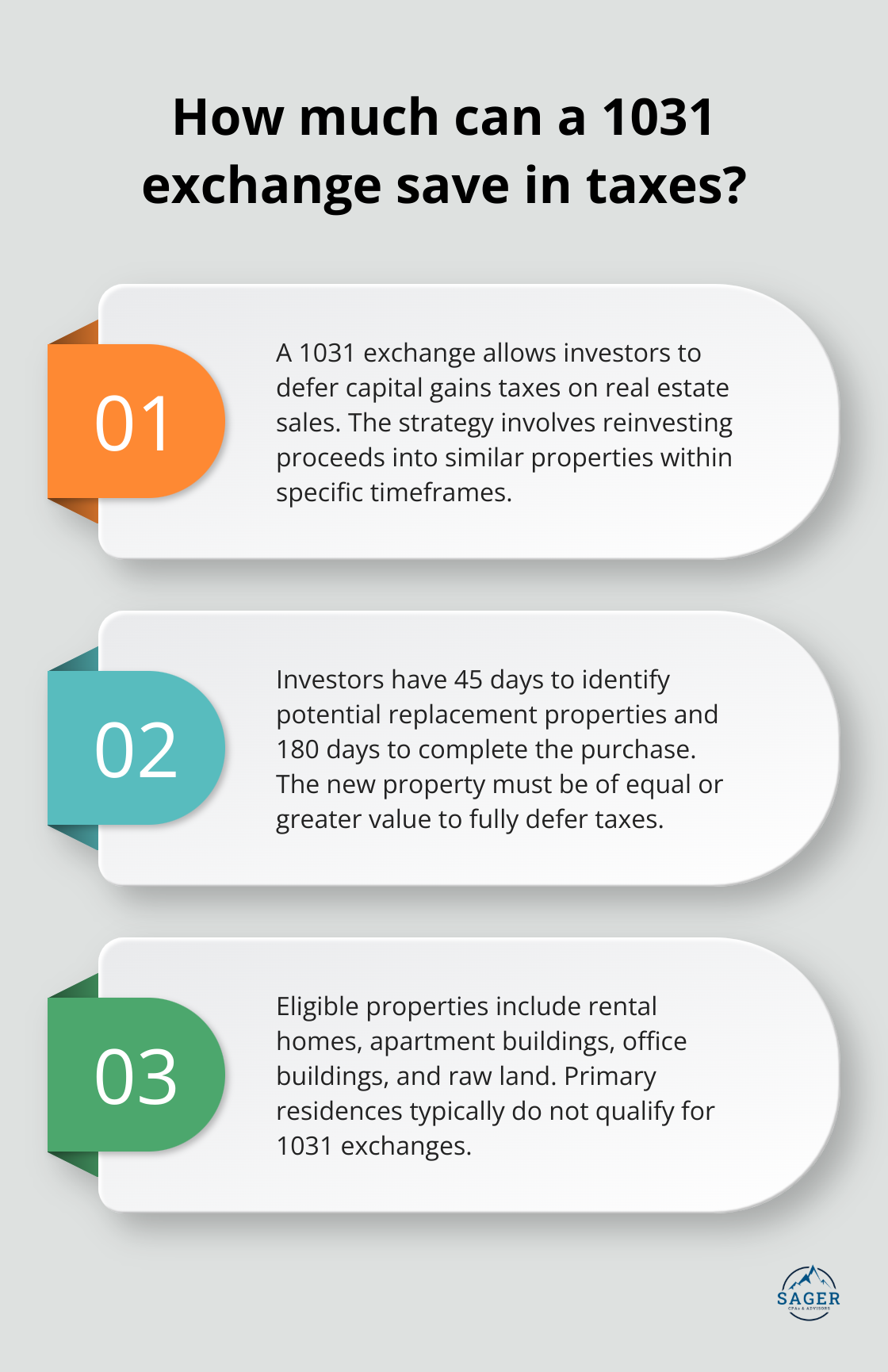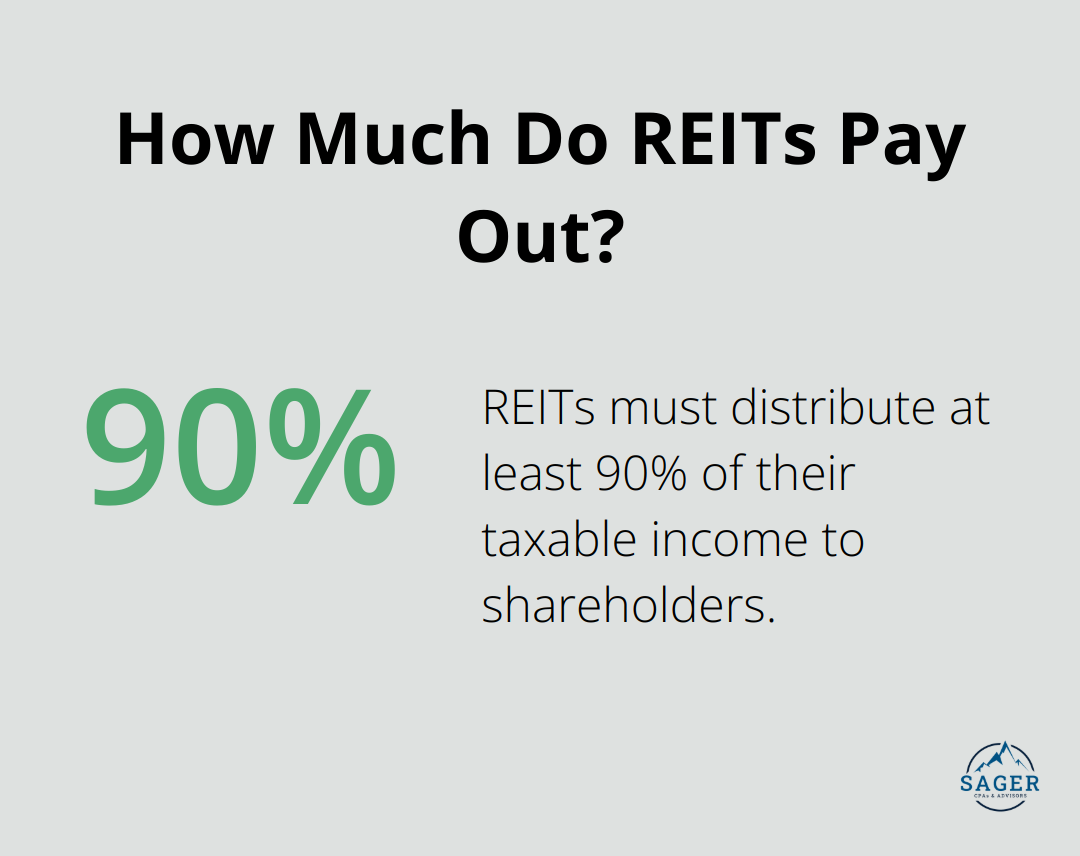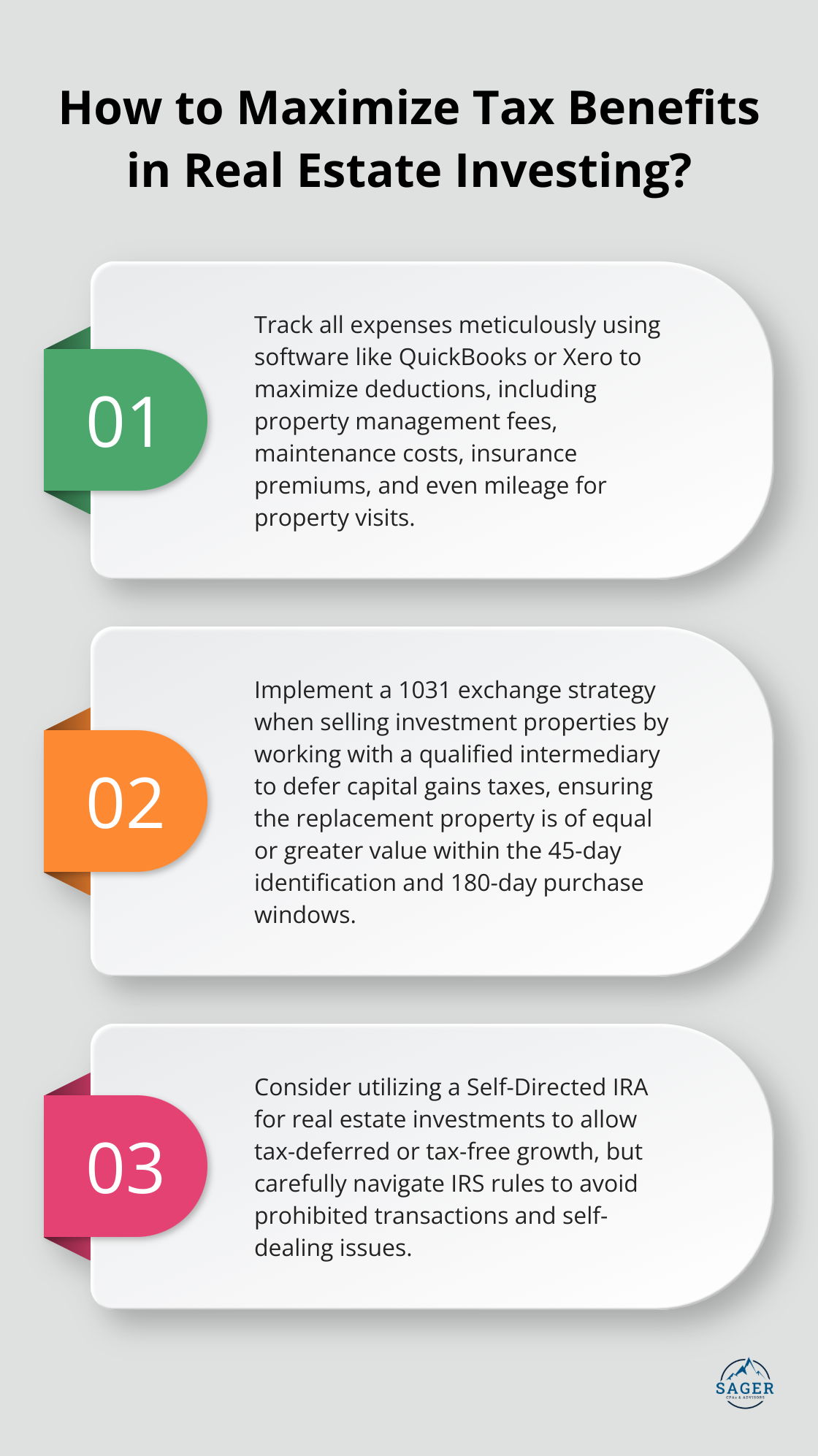
Real estate investment tax strategies can make or break your property portfolio’s profitability. At Sager CPA, we’ve seen firsthand how savvy investors leverage these strategies to maximize returns and minimize tax burdens.
This guide will walk you through key tax deductions, 1031 exchanges, and efficient investment structures that can significantly impact your bottom line. Whether you’re a seasoned investor or just starting out, understanding these tactics is essential for long-term success in real estate investing.
Real estate investors often overlook powerful tax-saving strategies that can significantly boost their bottom line. Let’s explore some of the most effective ways to reduce your real estate tax bill.
Mortgage interest is typically the largest deduction for real estate investors. The IRS allows you to deduct interest on loans used to buy, build, or improve investment properties. This includes interest on mortgages, home equity loans, and lines of credit. For example, if you pay $10,000 in annual mortgage interest on a rental property, that’s $10,000 you can deduct from your taxable income.
Property taxes are fully deductible for investment properties. This includes taxes paid to local and state governments. Keep in mind that the Tax Cuts and Jobs Act of 2017 limited the state and local tax (SALT) deduction to $10,000 for personal residences, but this cap doesn’t apply to rental properties. If you pay $5,000 in annual property taxes on your investment property, that’s another $5,000 off your taxable income.
Depreciation is a non-cash expense that allows you to deduct the cost of your property over time. Commercial property can be depreciated over a 39-year straight line, while residential property can be depreciated over a 27.5-year straight line. For a $250,000 residential rental property (excluding land value), you could deduct about $9,090 per year. That’s a substantial reduction in your taxable income without spending a dime.
Don’t overlook the day-to-day costs of running your rental property. These operating expenses are fully deductible and can add up quickly. This includes property management fees, maintenance costs, insurance premiums, and utilities that you pay as the landlord. Even seemingly small expenses like the cost of driving to your rental property for inspections or repairs are deductible.

To maximize these deductions, meticulous record-keeping is essential. We recommend using software like QuickBooks or Xero to track all your expenses. This not only makes tax time easier but also ensures you don’t miss any deductions.
Tax laws are complex and constantly changing. While these strategies can significantly reduce your tax bill, it’s essential to work with a qualified tax professional. A specialist in real estate tax strategies can help you implement these tactics effectively while staying compliant with IRS regulations.
Now that we’ve covered the basics of slashing your real estate tax bill, let’s move on to a powerful strategy that can help you defer capital gains taxes: the 1031 exchange. A 1031 exchange allows investors to defer capital gains tax on the sale of one investment property by reinvesting the proceeds into another like-kind property.
A 1031 exchange stands as a powerful tool for real estate investors who want to defer capital gains taxes. This strategy allows you to postpone paying tax on the gain if you reinvest the proceeds in similar property as part of a qualifying exchange.
The process starts when you sell your investment property. Instead of receiving the proceeds directly, you work with a qualified intermediary who holds the funds. You then have 45 days to identify potential replacement properties and 180 days to complete the purchase of one or more of these properties.

The new property must be of equal or greater value than the one you sold. If you buy a less expensive property, you’ll owe taxes on the difference. For example, if you sell a property for $500,000 and buy a new one for $450,000, you’ll owe taxes on the $50,000 difference.
The IRS requires that both the relinquished and replacement properties be held for investment or used in a trade or business. This means your primary residence typically doesn’t qualify.
Common eligible properties include:
You can exchange different types of properties. For instance, you could sell an apartment building and buy a retail space. The key is that both properties must be for investment purposes.
The tax savings from a 1031 exchange can be substantial. Let’s say you bought a rental property for $200,000 and sold it for $500,000. Without a 1031 exchange, you’d owe capital gains tax on the $300,000 profit. Assuming a 20% long-term capital gains rate, that’s $60,000 in taxes.
With a 1031 exchange, you can defer that $60,000 tax bill and reinvest the full $500,000 into a new property. This allows your investment to grow tax-free until you eventually sell without exchanging.
The IRS scrutinizes these transactions closely, and even small mistakes can disqualify your exchange. That’s why working with experienced professionals is essential. A 1031 exchange isn’t right for every situation, but for many real estate investors, it’s a game-changing strategy.
As we move forward, we’ll explore how to structure your real estate investments for optimal tax efficiency. This includes choosing the right business entity, utilizing self-directed IRAs, and understanding the benefits of Real Estate Investment Trusts (REITs).
Real estate investment structures can significantly impact tax liability and overall returns. This chapter explores various strategies to optimize your investment structure for maximum tax efficiency.
The choice of business entity has profound tax implications for real estate investors. Limited Liability Companies (LLCs) offer flexibility in profit distribution among members, optimizing tax efficiency. S-Corporations can provide additional tax savings through salary optimization, potentially reducing self-employment taxes. Partnerships allow complex profit-sharing arrangements but require careful planning to avoid tax pitfalls.

A single-member LLC might suit a small-scale investor with one or two properties. However, as portfolios grow, an S-Corporation could become more advantageous.
Self-Directed IRAs present a unique opportunity to invest in real estate using tax-advantaged retirement funds. This strategy allows investments to grow tax-deferred (or tax-free in the case of a Roth IRA). However, investors must navigate strict IRS rules surrounding these accounts. IRS regulations don’t allow transactions that are considered “self-dealing,” and they don’t allow your self-directed IRA to buy property from or sell property to certain related parties.
Real Estate Investment Trusts (REITs) offer a way to invest in real estate without direct property ownership. REITs must distribute at least 90% of their taxable income to shareholders, making them attractive for income-focused investors. The tax treatment of REIT dividends can be complex (with portions potentially qualifying for the 20% pass-through deduction introduced by the Tax Cuts and Jobs Act).
Opportunity Zone investments offer significant tax benefits for those willing to invest in designated economically distressed areas. Investors can defer capital gains taxes by reinvesting gains into Qualified Opportunity Funds. If held for 10 years, the appreciation on the Opportunity Zone investment becomes tax-free.
Structuring real estate investments for tax efficiency requires careful planning and expert guidance. The strategies outlined here can lead to substantial tax savings, but they must be implemented correctly to avoid costly mistakes. Tax professionals specializing in real estate can help investors navigate these complex waters to maximize their after-tax returns.
Real estate investment tax strategies can significantly impact your financial success. Key deductions like mortgage interest, property taxes, and depreciation reduce taxable income, while 1031 exchanges defer capital gains taxes. Efficient investment structures through LLCs, S-Corporations, or REITs optimize tax positions and protect assets.

The tax landscape changes constantly, making professional guidance invaluable. Sager CPA specializes in helping real estate investors maximize returns through strategic tax planning. Our team stays current with the latest tax laws to ensure informed decision-making.
Effective tax strategies free up capital for reinvestment, accelerating portfolio growth. This compound effect leads to greater wealth accumulation over time. Smart tax planning provides flexibility in investment decisions, allowing investors to seize opportunities without tax hindrances.




Privacy Policy | Terms and Conditions | Powered by Cajabra
At Sager CPAs & Advisors, we understand that you want a partner and an advocate who will provide you with proactive solutions and ideas.
The problem is you may feel uncertain, overwhelmed, or disorganized about the future of your business or wealth accumulation.
We believe that even the most successful business owners can benefit from professional financial advice and guidance, and everyone deserves to understand their financial situation.
Understanding finances and running a successful business takes time, education, and sometimes the help of professionals. It’s okay not to know everything from the start.
This is why we are passionate about taking time with our clients year round to listen, work through solutions, and provide proactive guidance so that you feel heard, valued, and understood by a team of experts who are invested in your success.
Here’s how we do it:
Schedule a consultation today. And, in the meantime, download our free guide, “5 Conversations You Should Be Having With Your CPA” to understand how tax planning and business strategy both save and make you money.